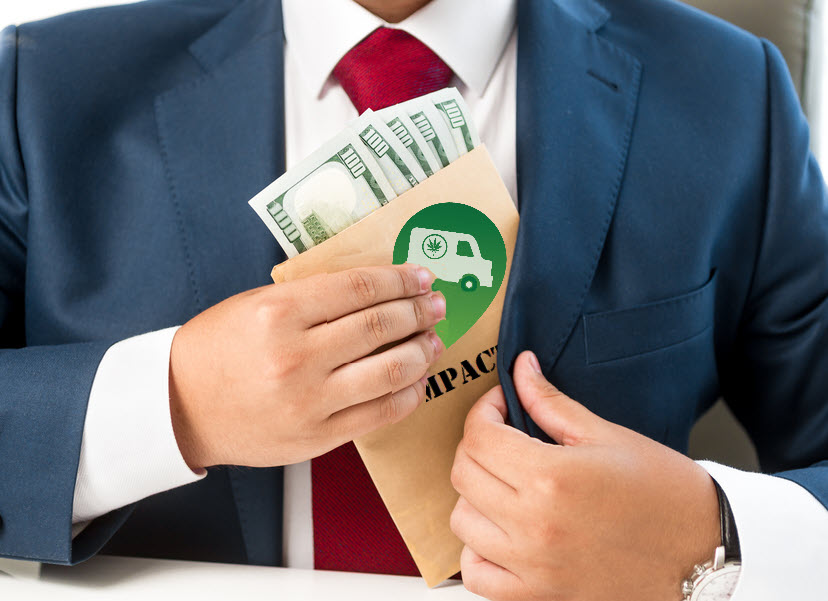
It’s local, it’s legal, and it’s blackmail
Massachusetts cannabis companies have paid over $50 million in community fees since 2018
Cannabis companies based in Massachusetts towns and cities have paid more than $53 million in impact fees since recreational cannabis sales began in the state. This is the result of a survey conducted by researchers from Northeastern University in 88 communities.
The poll was released by the Massachusetts Cannabis Business Association while lawmakers debated a final law that would force these cities to justify their actions. An action that many critics describe as a government cleanup.
One of the backers of the legislation, State Senator Sonia Chang-Díaz, reiterated that the report further demonstrates how unequal and arbitrary the local permitting process has become. She added that she looks forward to a time when the cannabis market lives up to our expectations, aspirations and values.
Currently, Massachusetts state law allows municipalities to levy a 3% tax on cannabis sales. Municipalities can also impose impact fees of up to 3% of a company’s annual revenue, provided the fee is “reasonably related” to the costs imposed by the entity. However, due to a lack of government oversight, many of these communities charge the cannabis business the maximum percentage without specifying any specific impact.
Meanwhile, local officials have argued the fees were agreed in good faith. They said the fees went a long way in containing the costs of introducing cannabis regulations, handling increased traffic and reviewing license applications.
Nonetheless, the Northeastern report has raised new questions about this practice, which has long been criticized by business owners and lawyers as a form of bribery. They believe the funds are being channeled into independent government projects while locking up our small cannabis businesses that cannot afford to pay the fees.
Of the 88 municipalities that claimed to have changed impact fees, including agreements made with the cannabis business, only 47 municipalities provided a public record of the fees charged. That means the $53.3 million is far less than the actual amount raised by those cities and communities.
The exception: Brookline
Fall River, a city whose ex-mayor is currently serving a 6-year sentence in federal prison for taking bribes from cannabis license applicants, earned $5.33 million in impact fees, more than any city that has participated in the survey. Although Fall River did not disclose how the money was spent.
Brookline, home of NETA, one of the country’s most successful pharmacies, is the second city on the list and received $4.9 million in fees. The total fee is in the hundreds of thousands of dollars that cannabis companies have wired to law enforcement officers who handle the city’s mandatory security details at cannabis dispensaries.
The city’s administrative director, Devon Fields, admitted that establishing cannabis stores has resulted in significant administrative costs and headaches in the neighborhood. Fields claimed the neighborhood was affected by various disorderly behaviors, including neighborhood trash, parking, traffic, and various foundation issues. She thinks the impact fees are justified and it would be a shame if the money flow stopped.
Unlike other cities, Brookline diverted funds to a separate account overseen by a local council, which publishes a comprehensive summary of all expenses when due. Fields believes the city has prudently managed the funds used to launch racial justice initiatives and hire substance abuse counselors. He also noted that the funds have helped Brooklyn persuade local cannabis retailers to prioritize diversity even when hiring.
Brookline has maintained a transparent process for everyone to see. Fields added that more oversight would be desirable, but the city doesn’t want to be in a situation similar to Fall River’s. Brookline quickly accepted that legalization of legal cannabis was inevitable, giving the city the advantage, time, and resources to make it all work.
Current attitude of the Massachusetts Municipal Association
As a representative of local government, the Massachusetts Municipal Association is campaigning against the planned ban on impact fees. The association argued that the impact fees are fair and provide a practical incentive for cities to host cannabis facilities.
The executive director of the Massachusetts Municipal Association, Geoff Beckwith, confirmed in a statement that the cannabis industry is publishing another report looking after the financial interests of its members. He believes this is an attempt to discredit agreements between host communities that have been negotiated fairly in the public interest.
Geoff believes cities and towns should retain the power to make decisions on behalf of taxpayers and residents regarding agreements with the marijuana industry.
Only 42 cities provided the researchers with their proof of expenditure as proof of income payment as part of the survey. Of these cities, half said the money is diverted to their general funds, which are then spent on various budget items and local initiatives. This is true regardless of whether they are related to the impact of grow facilities and cannabis businesses.
For example, Wareham used a larger percentage of its $1.7 million impact fee to fund the newest police headquarters, while Maynard used a percentage of its $137,000 impact fee to build four park benches. Other communities claim that the fees were used to fund various things like police cruisers, fire equipment, amusement rides, storm drains and so on.
According to Northeastern University public policy professor Jeffrey Moyer, while few of these claims are true, most of these cities are not transparent about their spending habits. Cannabis Business Association resident David O’Brien confirmed that many of these cities are using these mud monies with little transparency and no accountability.
Few cities like Lee and Northampton no longer receive impact fees that claim cannabis companies have been good to their neighborhoods and incur multiple measurable costs. Meanwhile, other cities have doubled. Haverhill, for example, challenged a lawsuit filed by a local cannabis store challenging impact fees.
Conclusion
As it stands, cannabis companies are willing to shoulder the real costs they can inflict on communities. What is objectionable, however, is being forced to pay a flat fee that is not imposed on non-cannabis businesses with identical effects. While there is certainly a need for local control in cities and towns, the comfort impact charge seems too ambiguous. It’s basically legalized bribery.
READ MORE ABOUT APPROPRIATE LICENSING IN CANNABIS…

THE BOSTON GLOBE LOOKS AT THE CANNABIS BRIBE IN MASSACHUETTS!

Post a comment: